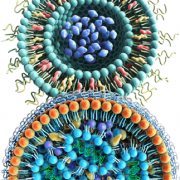Peripheral Neuropathy & Celiac Disease | Symptoms & Gluten-Free Diet
 Did you ever let your foot fall asleep and suffer from numbness and then a tingling, pins-and-needles sensation while it “awakened”? People with peripheral neuropathy suffer from those types of sensations—numbness and painful tingling—all the time. And there’s growing evidence that peripheral neuropathy is linked with celiac disease and gluten sensitivity.
Did you ever let your foot fall asleep and suffer from numbness and then a tingling, pins-and-needles sensation while it “awakened”? People with peripheral neuropathy suffer from those types of sensations—numbness and painful tingling—all the time. And there’s growing evidence that peripheral neuropathy is linked with celiac disease and gluten sensitivity.
- Jane Anderson, verywellhealth.com 1
About 10% of people newly diagnosed with celiac disease suffer from an associated neurological condition, usually peripheral neuropathy (which is quite common) or gluten ataxia (which is rarer).
_____
UPDATE: “50-60% of celiacs report symptoms anxiety, brain fog, mood swings/irritability & headaches.”
- Celiac Canada State of Celiac Survey, www.celiac.ca/state-of-celiac/
_____
Non-celiac gluten sensitivity is also a recognized condition. Researchers suggest that tingling and numbness in the extremities represent one of the most common gluten sensitivity symptoms.
Key Symptoms of Celiac and Gluten Sensitivity
Peripheral neuropathy actually is one of the most common non-digestive symptoms of celiac disease.
In fact, it’s possible to have no noticeable gastrointestinal symptoms of celiac disease, but instead to have mainly peripheral neuropathy and other neurological symptoms
Up to 22% of patients with celiac disease also develop neurologic or psychiatric symptoms, according to a 2012 review.
The symptoms of gluten neuropathy include:
- Tingling
- Numbness
- Pins and needles
- Tightness
- Pain and burning
Neurological symptoms such as peripheral neuropathy, migraine, and brain fog are even more common in non-celiac gluten sensitivity: research shows that up to 57% of people who have some form of neurological symptoms test positive for anti-gliadin antibodies, meaning that they’re likely sensitive to gluten but don’t have celiac.
If you have peripheral neuropathy and you’re diagnosed with celiac or gluten sensitivity, you may be able to improve or even resolve your symptoms by following the gluten-free diet—some studies have found the diet helps.
However, other studies have found that neurologic manifestations, including peripheral neuropathy, may continue or even develop after diagnosis, indicating that there may be a related inflammatory process involved.
The University of Chicago Center for Peripheral Neuropathy recommends that people with peripheral neuropathy induced by celiac disease make sure to consult with their physicians about discontinuing drugs that might cause peripheral neuropathy.
Practitioners also recommend that celiacs with peripheral neuropathy make lifestyle changes to reduce pain, including avoiding long periods of standing or walking, wearing loose shoes (in some cases, insurance might cover special therapeutic shoes), and soaking feet in ice water to ease pain and tingling.
Physicians also may be able to prescribe medication that can ease some of the discomforts of peripheral neuropathy, especially if it doesn’t seem to respond to the gluten-free diet.
Meanwhile, people with peripheral neuropathy, whether or not it appears to be related to celiac disease or gluten sensitivity, should make sure to be extra careful when they walk or move around since the lack of sensation in their feet could lead to a risk of falls.
Gluten Neuropathy Involves Nerve Damage
The tingling, numbness, and pain of peripheral neuropathy generally stem from nerve damage in your hands and feet. The nerve damage—and the symptoms—generally start in your longest nerves, which is why you’ll probably notice symptoms first in your feet and possibly your hands.
The weird sensations (sometimes your feet or hands can feel cold, or hot, or like someone’s jabbing them with a sharp instrument) usually start at the farthest point and work inward, up your legs and your arms. You can have just one nerve affected or multiple nerves.
Diabetes is the number one cause of peripheral neuropathy since nearly 60% of all diabetics will experience nerve damage. However, autoimmune conditions (celiac disease is autoimmune in nature) also have been linked with peripheral neuropathy.
Neuropathy Tied to Anti-Gluten Antibodies
In some cases, peripheral neuropathy seems to be related to gluten consumption—specifically, to the anti-gluten antibodies some people produce in response to gluten consumption.
In one study, researchers screened 215 patients with axonal neuropathy, a form of peripheral neuropathy involving damage to your axons, or bunches of nerves. A total of 140 of these had “idiopathic neuropathy,” meaning there was no apparent medical reason for their peripheral neuropathy.
The researchers tested those 140 people for antibodies to gluten using two celiac disease blood tests, the AGA-IgA test, and the AGA-IgG test. Although these tests are not thought to be very specific to celiac disease, they can detect if your body views gluten as an invader and is generating antibodies against the protein.
Thirty-four percent of those tested—47 people—had high antibodies to gluten in one or both of those tests, compared with a 12% rate of high antibodies to gluten in the overall population.8 Those test results could indicate that the people had gluten sensitivity since some experts are recommending the AGA-IgA and the AGA-IgG as gluten sensitivity tests.
The researchers also performed endoscopies and biopsies on those people in the study suspected to have celiac disease and found that 9% of those in the “unexplained neuropathy” group actually had celiac. The celiac disease genes HLA-DQ2 and HLA-DQ8 were found in 80% of all peripheral neuropathy patients.
Gluten Neuropathy Treatment
Research shows that following a gluten-free diet may help improve or resolve gluten neuropathy symptoms.
With a gluten-free diet, you’ll need to avoid grains containing gluten, such as wheat, barley, and rye. Focus on eating foods that are naturally gluten-free, including meat, beans, nuts, dairy, fruits, and vegetables.
Gluten is also in many processed food products. It’s important to look at ingredients on product labels. Many companies use labels that specify whether a product is “gluten-free” to help make them easier to identify.
Your healthcare provider can help give you guidance on how to eliminate gluten from your diet.
Does gluten neuropathy go away?
It probably won’t go away on its own. However, studies show the symptoms may improve or resolve when following a gluten-free diet. Healthcare providers may also be able to prescribe medication to help relieve symptoms.
Brannagan TH, Hays AP, Chin SS, et al. Small-fiber neuropathy/neuronopathy associated with celiac disease: skin biopsy findings. Arch Neurol. 2005;62(10):1574-8. doi:10.1001/archneur.62.10.1574
1 https://www.verywellhealth.com/gluten-and-neuropathy-562315













